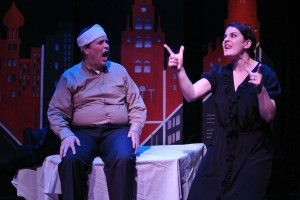
 “A Brief History of the Soviet Union” is not a single story, but rather a series of chronological vignettes that take place at strategic points in the history of the USSR. Starting with the Russian revolution of 1917, and ending around 2000, we are treated to about 10 short stories involving characters who are all trying to live out their lives as peacefully as they can.
“A Brief History of the Soviet Union” is not a single story, but rather a series of chronological vignettes that take place at strategic points in the history of the USSR. Starting with the Russian revolution of 1917, and ending around 2000, we are treated to about 10 short stories involving characters who are all trying to live out their lives as peacefully as they can.
The play opens with the monologue of a Russian servant. Still a teenager, she has already worked many years as housemaid to an aristocratic family. The maid, played with great talent by Marissa Parness, shares with us her witnessing of the burning of her employer's mansion, and the rioting in the streets. Amid the chaos, and with the family having left the city, she is finally able to have a few moments of freedom to be with a boy she has long loved. Dramatically, she describes how they made love right out in the open, atop the long cascading staircase, right on the red carpet she had been charged with keeping clean.
In a later segment we get to see interactions of two men—well played by Ron Bopst and Guy Rader—after one returns from 20 years of hard labor for being falsely accused of conspiracy by the other man. And in the next segment, taking place during the cold war, we see two men covertly spying on one another, until they realize they are both KGB spies. “Wouldn't it be nice," says one of them, “if everyone worked for the KGB? Then we would all be free.”
And freedom is the key word throughout: how to be free, what freedom even means to different people, and how one can be free living under oppressive circumstances. For some, as we see in a later segment featuring Henry Dwyer, freedom means leaving for other parts of the world, as many did in the 1980s. But even then, there is the heartache of leaving behind the world you have always known. By the 1990s, we see that the former USSR has turned into an open society -- in that you can steal and trade whatever you want, even the absurd, like penises of “bachelor” sold to China as an aphrodisiac. Violence continues, now no longer in the name of mother Russian, but in the name of the all mighty dollar (yes, that's the US dollar).
Ron Bopst and Guy Rader each have a powerful stage presence, and Henry Dwyer was equally comfortable with dramatics as well as light comedy. While not the comedy it wants to be thought of, “Brief History” has humor and also great poignancy.
Performances of "A Brief History" continue through Feb. 1 at the Dorothy Strelsin Theatre. Be sure to check out our interview with Artistic Director Alan Winner and actress Marissa Parness here.
Through Feb. 1 at the Dorothy Strelsin Theatre.